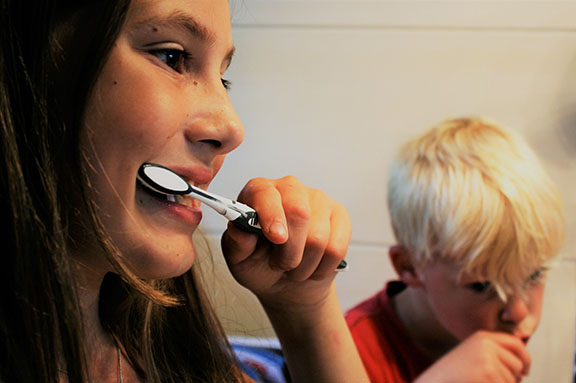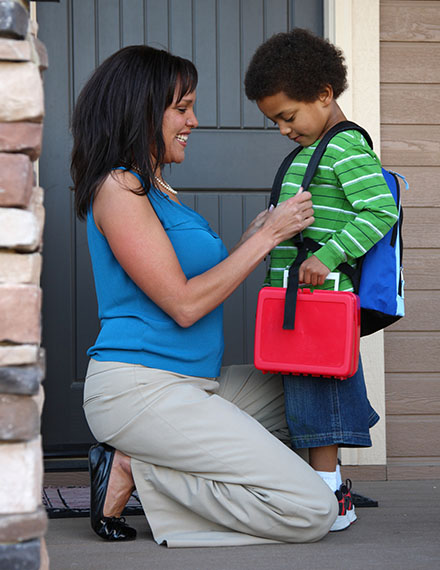(Posted 2019 October, Updated 2022 October)
 Do you want your mornings to be more peaceful? It is safe to say that most people don’t want to feel rushed and under pressure to get to work and school on time. Starting the morning off in a frenzy can have a negative impact on the way the rest of the day goes for everyone in the family.
Do you want your mornings to be more peaceful? It is safe to say that most people don’t want to feel rushed and under pressure to get to work and school on time. Starting the morning off in a frenzy can have a negative impact on the way the rest of the day goes for everyone in the family.
Getting the day started smoothly all comes down to developing a tried and true morning routine. It helps everyone to know what is expected, and get their day started with less stress. Here are a few tips from Parenting Education Programs' staff about how to have easier mornings:
1. A Good Morning Routine Starts the Night Before.
Free up time in your morning schedule by getting some essentials done at night.
 Involve children in planning and helping to pack lunches each evening or on Sundays for the whole week. Children are more likely to eat a packed lunch, if they help decide what’s in it.
Involve children in planning and helping to pack lunches each evening or on Sundays for the whole week. Children are more likely to eat a packed lunch, if they help decide what’s in it.- Have children pack their backpacks and put them in a designated place each evening to avoid a last-minute search on the way out the door.
- Make breakfast the night before. Google “make ahead breakfasts” for ideas.
 Pick out clothes the night before. Involving your child in this decision-making process is a great way to give them a little control over their morning routine.
Pick out clothes the night before. Involving your child in this decision-making process is a great way to give them a little control over their morning routine.
- For younger children, give them choices. They can wear A or B.
- As they get older, allow them more freedom – keep a selection of appropriate school clothes at their level to choose from.
- For younger children, lay out clothes at night in the order of putting them on.
- Proper rest is essential to a good morning. Make sure your children get enough sleep with our suggestions for a successful bedtime routine.
2. Morning Motivation Starts with You.
 Get up before your children – Give yourself enough time to get ready (shower, dress, pack, etc.) before they wake up.
Get up before your children – Give yourself enough time to get ready (shower, dress, pack, etc.) before they wake up.- Be supportive in waking children up from sleep. It is easier to wake up to a gentle back rub and a pleasant “Good Morning,” than bright lights in their faces and a loud voice commanding them to "get up."
- Help younger children get dressed and assist in doing things they cannot do. Things your child can do should be reinforced and praised.
 Put up a chart to help children remember everything they need to do in the morning.
Put up a chart to help children remember everything they need to do in the morning.
- Use pictures to help younger children keep on track with tasks like brushing teeth, combing hair, putting clothes and shoes on, etc.
- Try it out and talk about it with your children.
- Adjust for anything that causes your children to stumble.
- Resist the urge to do everything for them.
3. A Positive Attitude is Everything – Lead by Example!
- Children can sense when you are becoming rushed and frustrated, and they may slow down and resist. Hopefully using the previous tips will prevent you from being rushed.
- If you are feeling out of sorts, talk to your children at their level about ways they can help right then. Children love to help and tend to appreciate being given responsibility.
 Try to really focus on keeping your attitude positive and affirming.
Try to really focus on keeping your attitude positive and affirming.- When you feel yourself losing patience, take a breath and talk softly to remind yourself to use a calm voice.
- Encourage your children. Praise them for a great job picking out clothes, or getting dressed, or being on time.
- Remember change can’t happen overnight for you or your children. Stick with the routine for at least 30 days to establish better habits over time.
Return to the Parenting Education Programs' Back to School Routines series' page to learn more tips.
The Parenting Education Programs is now enrolling for upcoming classes. Join us for more information about positive and effective ways parents can interact with their children at every age and stage of development. We would love to hear from you. If you have questions or feedback about the topic in this article email us.
Content in this article is based on the Parenting Education Programs class curriculum: Establishing Nurturing Parenting Routines. Nurturing Program for Parents and Their School Age Children 5 to 11 years (p. 92-95) by Stephen J Bavolek, Ph.D.
This posting is part of the Department of Family Services' Community Corner where you’ll find timely information about upcoming events, parenting and wellness tips, programs and services, and more! Share these helpful posts with your friends and family. Don't miss out on future postings; sign-up today!

